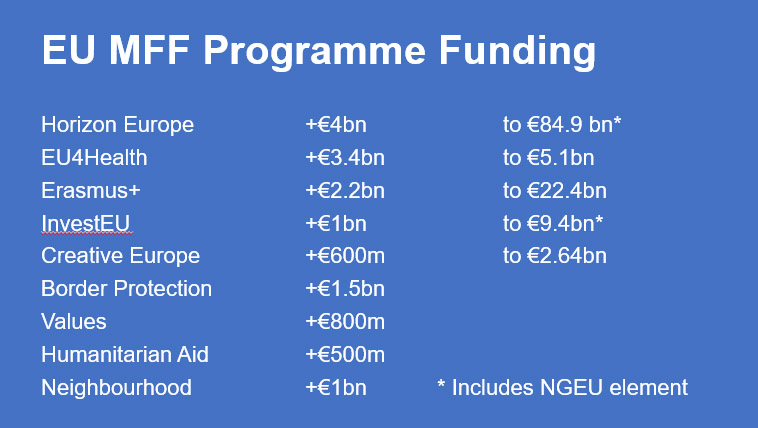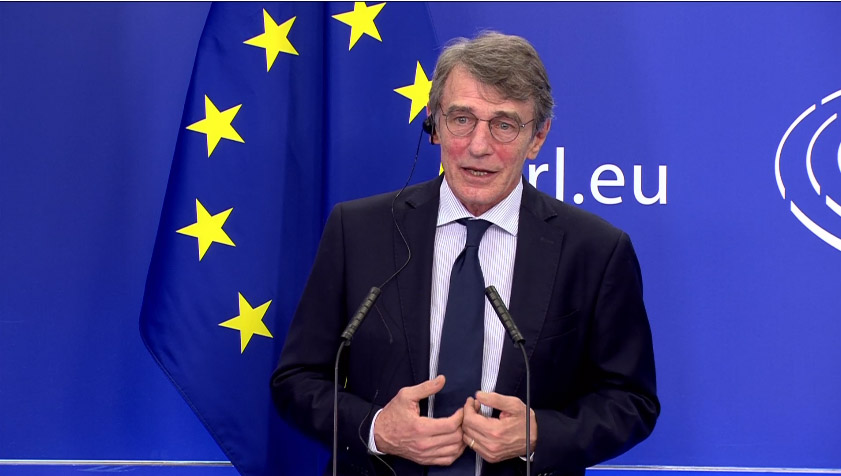The long running sage of the European Union Multiannual Financial Framework has concluded, as forecast on this site, before the UK’s payments into the EU Budget come to an end next month.
The negotiations between Parliament and the Council took longer than ideal, meaning that ratification the MFF and the NGEU recovery package by member state governments will run into the new year. The Council’s clumsy deadline of 30 September was the wrong approach to deliver Parliament’s consent. Accordingly Parliament held out for concessions but not for long. No lasting damage is done and possibly progress to reforming its budgetary affairs may even have taken a few steps forward.
What was agreed?
The outcome of the negotiations was a legal agreement between Council and Parliament that met each side’s bottom line:
- No overall change in the headline figures for 2021-27: and MFF of €1,074.3 billion and €750 billion NGEU recovery package (both at 2018 prices).
- An additional €15 billion for the EU MFF programmes largely by re-direction of fines to the EU budget – so the overall ceilings (and so the overall spend for member state exchequers remains as agreed in July.
- An extra €1 billion for the Flexibility Instrument.
- Parliament gets the scrutiny it was demanding over NGEU – always the easiest and most sensible concession to make.
- The Commission with make a recommendation on a mid-term review.
- An “indicative roadmap” toward the introduction on new ‘own resources’.
Our analysis had argued that movement in the overall MFF ceilings was a non-starter but that there were easy concessions and repurposing to be done but that other areas of progress were both possible and desirable and that the political imperatives pointed to resolution before the year was out.
What does this all mean?
The fiscal commitments of member states agreed in July are not re-opened, meaning the most important aspect of the agreement from their point of view remains in place.
Parliament has built on the improvements in programme funding achieved in the September settlement – Horizon gets an additional €4 billion, Erasmus+ €2.2 billion and the Health programme is trebled from €1.7 billion with an extra €3.4 billion (see the full listing below). However it is funded this is real money and a great deal more than Parliament had achieved at the same stage of any previous MFF negotiation. Overall it is a 1.5% increase in the value of the seven year MFF but for the flagship programmes to which it is dedicated it means a great deal more: Horizon +5%, EU4Health +200%, Erasumus +10%, InvestEU +12%, Creative Europe +36% – all increases well worth having. The extra money will come from some repurposing but also from fines from such things as competition policy coming into the budget – a principle Parliament will be as keen to grasp as the cash it yields.

The Council’s July settlement had written out the mid-term review of the MFF – now it is back, though conditional on a report from the Commission on whether it is needed. No bad thing and an easy concession but if every there was an MFF where a review might prove necessary it is this one. Parliament also gets the scrutiny it was looking for over NGEU. Commitments on ‘horizontal issues’ will be banked – that is the commitment to deliver 30% of the budget toward climate relevant spend, gender mainstreaming and from 2026 a commitment to attribute 10% of the budget to protecting biodiversity – but the challenge for legislators is to ensure that the fine words are carried through to good deeds.
The most significant step, however, may yet be the roadmap for the introduction of new ‘own resource’. “Indicative roadmap” is a strange choice of words, given the greater clarity which the co-rapporteur, Valerié Hayer, was happy to provide to the media, amplified 24 hours later by Parliament President, David Sassoli (above). Ms Hayer, who is something of a rising star, said the timetable would be legally binding and assumes little progress at OECD level, she gave July 2021 as the date for a Commission proposal on a Digital Levy, a new Emission Trading System and Carbon Border Adjustment Mechanism, with Council decision by July 2022 and introduction from January 2023. The next package, including a Financial Transactions Tax, would be outlined by the end of 2022 with Commission publishing its proposals in July 2024, the Council agreeing by July 2025 and introduction in January 2026.
If the EU can hold to this timetable it will achieve two things. It will provide a means of debt repayment for NGEU (and any sovereign debt that may follow) that will not impact on the programmes in the first instance. As importantly, the EU by the time it is agreeing its next MFF, would have broken the cycle that pits Parliament against the member states in a toxic budget procedure from which there are no winners.
But that is a very big ‘if’ indeed. Member states have till now zealously guarded their primacy in tax raising. Agreement, however, is in everyone’s interests and if it can be understood real progress might just be made.
What happens now?
Parliament gives its consent to the MFF on the basis of the political agreement announced today, 10 November, – the required majority is guaranteed. It then returns to Council for approval – unanimity is required and the wording of the treaties states that “Council shall” rubber stamp an agreement with Parliament. The MFF with the status of a treaty, goes back to the member states for ratification.
At least that’s what should happen. Separately, however, Parliament and the member states last week approved the Rule of Law Conditionality Mechanism that enables financial sanction to be brought against states casting themselves as illiberal democracies and infringing fundamental rights. Although the measures are separate Hungarian PM, Viktor Orbán, has threatened to veto the MFF (possibly along with Poland).
This is not a desirable outcome for anybody and both MEPs and other member states take the view that Orbán is blustering. However, some examining the detail of the treaties have concluded that a single member state blocking progress unreasonably could be legally over-ridden and there would seem to be some wiggle room in Article 312 of TFEU. In any case, the Rule of Law Mechanism could be held to apply to the ‘roll over’ budget for 2021 which would come into force in the absence of an MFF agreement and thus enable sanctions against transgressing governments to be taken – in theory. In reality, the Rule of Law Mechanism is cumbersome and difficult to implement – though it is thought to be workable. It is based on qualified majority rather than unanimity and the critical ingredient is political will. Blocking the MFF would certainly spur on those keen to confront Hungary and Poland.
But leaving the legal considerations to those better qualified, the real issue is politics. If Orbán by his actions is seen to deprive the EU – including his own country, a major EU beneficiary – of recovery funds or any regional development or cohesion funds then he may consider the financial and political cost too great – his choice of words has left sufficient room to step away from veto. Events in the United States ought to have by now convinced EU leaders of the need to act against illiberal nationalist democracies.
The conclusion of the MFF was one essential step for the EU to move on the Rule of Law Mechanism was another, we remain confident it will be over soon.

